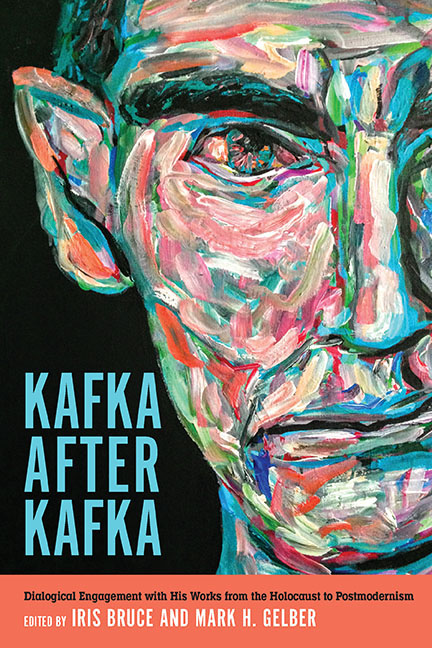Introduction
Published online by Cambridge University Press: 12 April 2019
Summary
Unsere Kunst ist ein von der Wahrheit Geblendet-Sein: Das Licht auf dem zurückweichenden Fratzengesicht ist wahr, sonst nichts.
[Our art is a being-blinded by the truth; only the light on the receding grimace is true, but nothing else.]
—Franz KafkaAS SUSAN SONTAG HUMOROUSLY PUT IT, Franz Kafka's oeuvre, like Samuel Beckett's, has “attracted interpreters like leeches.” Indeed, Kafka has not only elicited a vast number of academic commentaries; he has also inspired numerous artists in their creative work: in poetry, fiction, drama, film, painting—even music. When we talk about Kafka as an “inspiration,” we are obviously not suggesting that these artists were somehow or merely “influenced” by Kafka, but rather that they exemplify and contribute to the many ways in which we read his texts. In his famous essay, “Kafka and His Precursors,” the Argentinian writer Jorge Luis Borges even argued that Kafka has precursors whom he most likely never read. If, then, there is a “Kafkaesque” literature “before Kafka,” all the more should we attempt to identify an entire “Kafka after Kafka” corpus. Of the countless artists and thinkers around the globe engaging with Kafka, a few examples will serve to illustrate a variety of relationships between Kafka and the world of artistic and intellectual creativity.
The history of Kafka reception is a long one, already beginning during his lifetime in Prague, but also beyond Prague. One high point would include the well-known philosophical commentaries on Kafka by Albert Camus, linking him to French existentialism and to Camus's theory of the absurd. Another high point would be the much-quoted response to Kafka by Walter Benjamin on the tenth anniversary of Kafka's death. One could also cite Theodor W. Adorno and Gershom Scholem as important receptors of Kafka. After World War II, the American novelist Philip Roth portrayed Kafka as a potential victim and survivor of the Holocaust in his essay “‘I Always Wanted You to Admire My Fasting’; or, Looking at Kafka” (1972). Roth's The Breast (1972) is a rewriting of Kafka's The Metamorphosis, with the difference that the protagonist turns into a huge breast. And in Roth's The Professor of Desire (1977) the protagonist visits one of Kafka's former prostitutes in Prague. Daniel Medin has viewed Philip Roth, together with J. M. Coetzee and W. G. Sebald, as “sons of Kafka.”
- Type
- Chapter
- Information
- Kafka after KafkaDialogic Engagement with his Works from the Holocaust to Postmodernism, pp. 1 - 8Publisher: Boydell & BrewerPrint publication year: 2019



